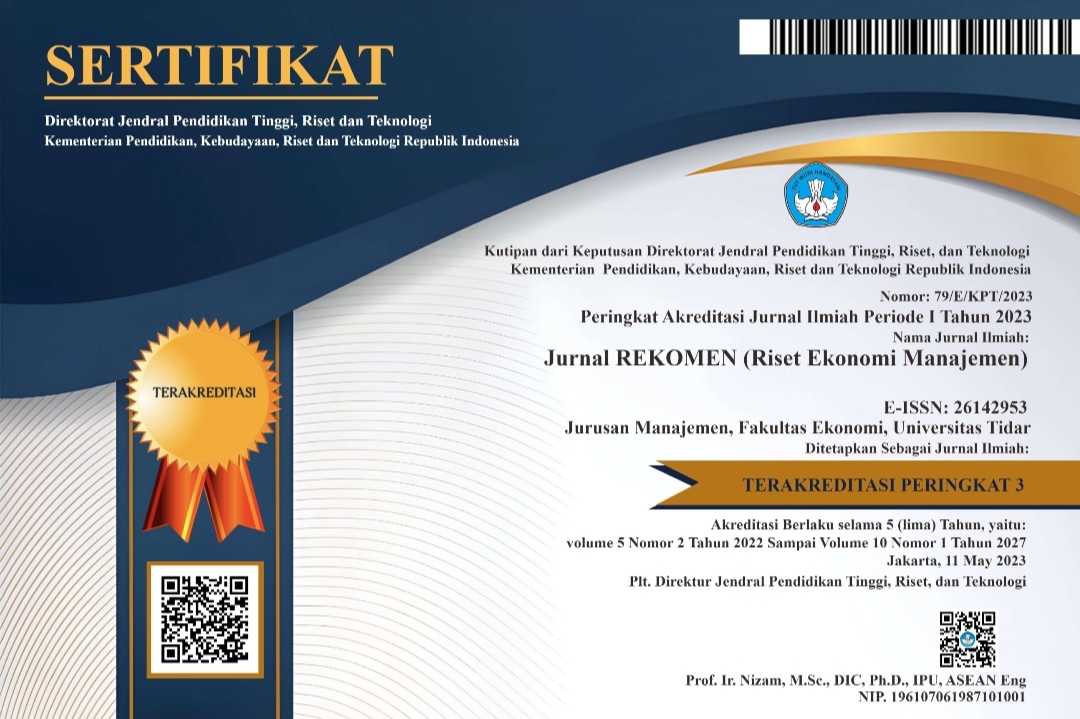A Young Entrepreneur Triumph: A Study On The Determinants Of Entrepreneurial Intention Of University Students
DOI:
https://doi.org/10.31002/rekomen.v6i2.1051Keywords:
Entrepreneurial Intention, Students, Young EntrepreneurAbstract
This study aims to examine several factors that can influence student entrepreneurial intentions through factors of family support, weak institutions, need motivation, opportunity motivation, university support, self-efficacy, and leadership. The approach used is a quantitative approach by conducting a survey of 120 students who already have businesses spread across several universities in Yogyakarta. The results showed that family support, opportunity motivation, university support, self-efficacy, and leadership had a significant and positive influence on entrepreneurial intention. “Poor” institutional factors have a negative effect, thus providing an inverse impact. As an implication, the government and universities are expected to be more consistent in providing a forum for classroom learning and direct practice by involving student organizations and financial support for students who do business so that their businesses can grow and open as many jobs as possible.
References
Ajzen, I. (1991). The theory of planned behavior: Organizational behavior and human decision processes. Organizational Behavior and Human Decision Processes, 50 (2): 179–211. https://doi.org/10.1016/0749-5978(91)90020-T
Arrighetti, A., Caricati, L., Landini, F. and Monacelli, N. (2016). Entrepreneurial intention in the time of crisis: A field study. International Journal of Entrepreneurial Behavior & Research, 22 (6): 835-859. https://doi.org/10.1108/IJEBR-12-2015-0326
Bandura, A. (1997). Self Efficacy: The Exercise of Control. New York: W H Freeman/Times Books/ Henry Holt & Co.
Bird, B. (1988). Implementing entrepreneurial ideas: The case for intention. Academy of Management Review, 13 (3): 442–453. https://doi.org/10.2307/258091
Echavarria-Diez, L., Alejandro, V.A., Jonathan, B., Fausto, O.M.P., Maria, L.U.M., & Jairo, A.T.V. (2019). Extension of the systemic entrepreneurship intention model in university students. Serbian Journal of Management, 14 (2): 277 - 297. https://doi.org/10.5937/sjm14-17336
Elenurm, T. (2012). Entrepreneurial orientations of business students and entrepreneurs. Baltic Journal of Management, 7 (2): 217–231. https://doi.org/10.1108/17465261211219822
Fairlie, Robert W., & Fossen, Frank M. (2018). Opportunity versus necessity entrepreneurship: Two components of business creation. CESifo Working Paper Series, 6854.
Fuentelsaz, L., Consuelo, G., Juan, P.M., & Javier, M. (2015). How different formal institutions affect opportunities and necessity entrepreneurship. Business Research Quarterly, 18 (4): 246-258. https://doi.org/10.1016/j.brq.2015.02.001
Hermawan, A., Arief, M., & Rahayu, W. P. (2018). Dimensions of the Javanese culture and the role of parents in instilling values in creative industry entrepreneurship. International Journal of Engineering & Technology, 7(2.29): 182–189. https://doi.org/10.14419/ijet.v7i2.29.13313
Kazumi, T., & Norifumi Kawai. (2017). Institutional support and women’s entrepreneurial self-efficacy. Asia Pacific Journal of Innovation and Entrepreneurship, 11 (3): 345-365. https://doi.org/10.1108/APJIE-12-2017-041
Koe, W.-L. (2012). Determinants of entrepreneurial intention among the millennial generation. Social and Behavioral Sciences, 40: 197-208. https://doi.org/10.1016/j.sbspro.2012.03.181
Koe, W.-L. (2016). The relationship between individual entrepreneurial orientation (IEO) and entrepreneurial intention. Journal of Global Entrepreneurship Research, 6 (13): 1–11. https://doi.org/10.1186/s40497-016-0057-8
Kristiansen, S., & Indarti, N. (2004). Entrepreneurial intention among Indonesian and Norwegian students. Journal of Enterprising Culture, 12 (01): 55–78. doi: 10.1142/S021849580400004X
Liñán, F., Rodríguez-Cohard, J. C., & Rueda-Cantuche, J. M. (2011). Factors affecting entrepreneurial intention levels: A role for education. International Entrepreneurship and Management Journal, 7 (2): 195–218. https://doi.org/10.1007/s11365-010-0154-z
Manik & Kusuma. (2021). Entrepreneurial orientation and entrepreneurial intention: When more learning exposures are efficacious. Jurnal Ekonomi & Bisnis. Working Paper.
Marini, C. K, & Hamida, S. (2014). Pengaruh self-efficacy, lingkungan keluarga, dan lingkungan sekolah terhadap minat berwirausaha siswa SMK Jasa Boga. Jurnal Pendidikan Vokasi, 4(2): 195–207. http://dx.doi.org/10.21831/jpv.v4i2.2545
Mustafa, M.J., Hernandez, E., Mahon, C. and Chee, L.K. (2016). Entrepreneurial intentions of university students in an emerging economy: The influence of university support and proactive personality on students’ entrepreneurial intention. Journal of Entrepreneurship in Emerging Economies, 8 (2): 162-179. https://doi.org/10.1108/JEEE-10-2015-0058
Nofiani, D., Indarti, N., Lukito-Budi, A. S., & Manik, H. F. G. G. (2021). The dynamics between balanced and combined ambidextrous strategies: A paradoxical affair about the effect of entrepreneurial orientation on SMEs’ performance. Journal of Entrepreneurship in Emerging Economies, 13 (5): 1262-1286. https://doi.org/10.1108/JEEE-09-2020-0331
Park, Cheolwoo. (2017). A study on the effect of entrepreneurship on entrepreneurial intention: Focusing on ICT majors. Asia Pacific Journal of Innovation and Entrepreneurship, 11 (2): 159-170.
Putra, Cokorda Bagus Wiadnyana, and I. Wayan Ramantha. “Kepribadian, Motivasi, Dukungan Keluarga dan Pendidikan terhadap Minat Berwirausaha Mahasiswa Jurusan Akuntansi.” Jurusan Akuntans, vol. 31, 2021, pp. 324-336, 10.24843/EJA.2021.v31.i02.p05.
Sandi, A., & Mafizatun, N. (2019). Effect of entrepreneurship education, family, environment and self efficacy on students' entrepreneurship intention. Proceedings of the 4th International Conference on Management, Economics and Business (ICMEB 2019), Atlantis Press, 9 (12): 2352-5428. https://doi.org/10.2991/aebmr.k.200205.003
Sekaran, U., & Bougie, R. (2013). Research Methods for Business. New Jersey: John Wiley & Sons.
Setiyadi, D. B. P. (2012). Pemahaman kembali local wisdom etnik Jawa dalam tembang macapat dan pemanfaatannya sebagai media pendidikan budi pekerti bangsa. Magistra, 24(79), 71-76
Silva, Lilanka De., Revindra, D. (2020). Factors affecting for the entrepreneurship intention of undergraduates. Journal of Multidisciplinary Engineering Science and Technology, 7 (5): 11923-11936.
Tatiana, B., Shirokova, G., Wales, W., Gafforova, E. (2020). Benefiting from the economic crisis? Strategic orientation effect, trade-offs, and configurations with resource availability on SME performance. International Entrepreneurship and Management Journal, 16: 165-194.
Downloads
Published
Issue
Section
License
Copyright (c) 2023 Jurnal REKOMEN (Riset Ekonomi Manajemen)

This work is licensed under a Creative Commons Attribution-ShareAlike 4.0 International License.



















